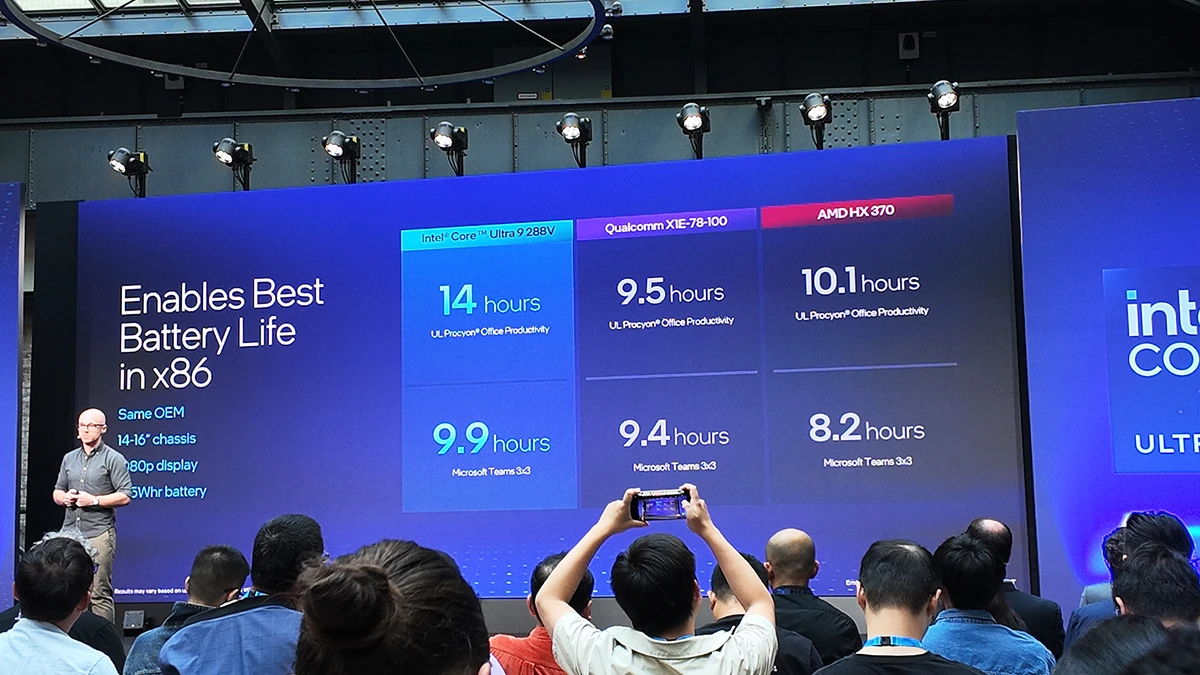Intel's Lunar Lake processor is the most energy-efficient x86 processor Intel has ever built. It will be available on desktops soon.
Intel has kept its cards close to the chest when it comes down to the battery life of its latest mobile processors. Lunar Lake. It could be because Qualcomm released a new ARM processor lineup promising a long battery life around the same time as Intel's announcement, or--no--that's not likely it. Lunar Lake's launch event was the first time Intel has given its own estimates of how long Lunar Lake can last outside the outlet.
According to Intel, Lunar Lake's battery life will be around 14 hours in UL's Procyon Office Productsivity test. Compare this to the 10 hours of battery life on AMD's latest Ryzen AI9 HX 370 or 9.5 hours on Qualcomm's new X1E78-100 in laptops with similar specs (70-78Whr) and battery capacities.
Intel will have chosen some favourable battery benchmarks to show off here, too. Intel will also have selected some battery benchmarks that are favourable to showcase here. Qualcomm boasted of double-digit battery life sometimes and AMD, for the record, has a good track record when it comes to battery.
Intel published a new slide that claimed a battery life of over 20 hours for the Core Ultra 7268V. However, the "OEM machine", which it did not specify, was only 18.4 hours. Intel and Qualcomm both had smaller batteries and longer battery life than the systems noted above.
Intel claims that its new Lion Cove (P-core) and Skymont (E-core) core architectures were designed with power savings in mind. These Lunar Lake processors do away with Hyper-Threading to save transistors and power.
Intel's Robert Hallock had the opportunity to repeat a statement he has made several times before. "It is not the instruction set which determines efficiency."
This is more aimed at ARM-based chips than its competitor's x86 processors. Intel's Lunar Lake launch event in Berlin saw it take a few potshots at Qualcomm's X Elite processors, pointing out instances when the Qualcomm chip could not produce comparable results.
Intel will also dig out those incompatible benchmarks to make a statement, but there is something compelling in its bid for a new processor which is extremely efficient and does not require a reworking the entire software stack to run. ARM-based processors often do. However, this process is already underway.
We'll have to wait and see if Intel's claims about battery life are reflected in the laptops that we see on the shelves. These are 'best-case scenario' figures and some laptops will be less capable.
There will be a wide range of performance and battery life depending on how OEMs set up each chip. Intel, for example, said that a 9 W processor could be fanless if someone wanted to build it. However, you can forget about gaming.
The main thing that excites me is whether the claimed improvements in GPU performance combined with this battery life will translate into a powerful handheld gaming PC. If Intel can overcome the slightly wobbly game compatibility and drivers, and upgrade the entire package, this could be a powerful machine with increased battery. There are ifsthere.
We know that at least one Lunar Lake handset is coming. This is MSI's Claw 8 smartphone.
Intel's intention to use the power savings in future generations of CPUs, including "other segments", is important for us gamers. Arrow Lake, the next generation of desktop CPUs, is expected to have a dramatic reduction in power consumption. This means that we will see these savings on desktops sooner rather than later.




Comments